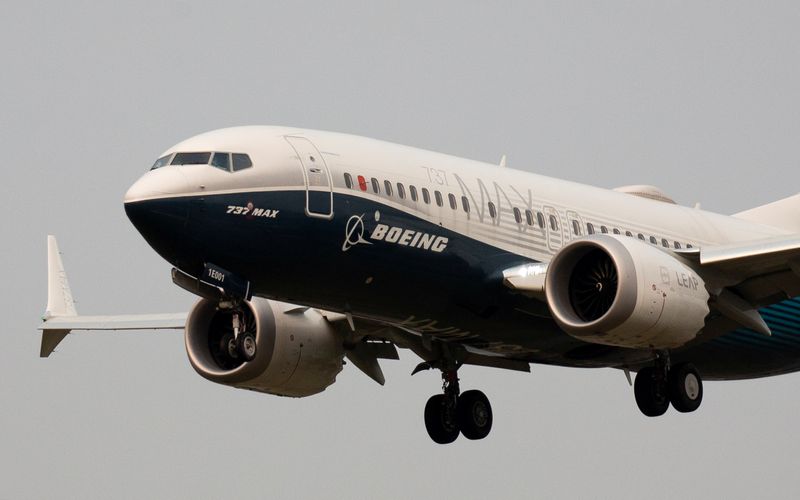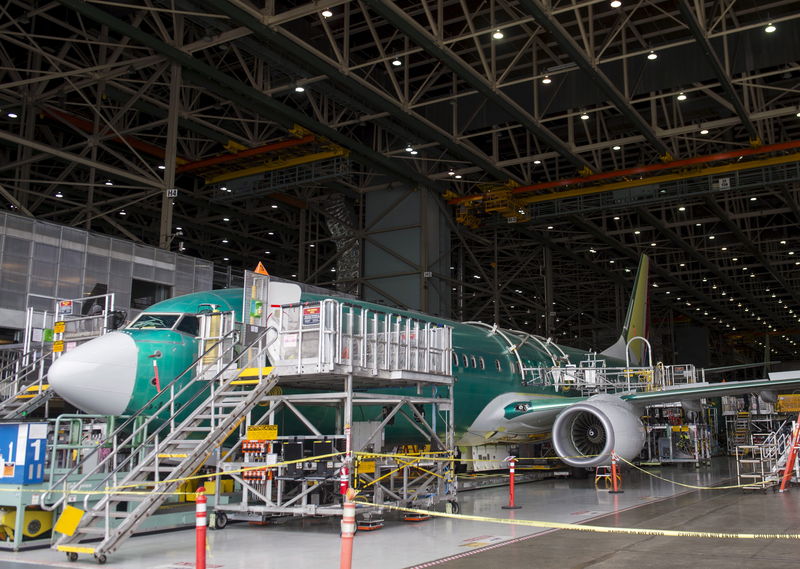By David Shepardson
WASHINGTON (Reuters) -The Federal Aviation Administration will not immediately allow Boeing (NYSE:) to increase production of the 737 MAX as it addresses ongoing safety concerns, the administrator said on Thursday after a meeting with outgoing CEO Dave Calhoun and other executives.
The FAA’s stepped-up oversight of Boeing will continue in coming months, with weekly meetings and quarterly exchanges between the company’s heads and the U.S. regulator. The planemaker was barred by the FAA in February from increasing production of its best-selling plane after a door panel exploded during a Jan. 5 flight on a new 737 MAX 9.
FAA Administrator Mike Whitaker said he did not expect Boeing to receive approval to increase production of the MAX “in the coming months” and has not yet had discussions with Boeing on the matter.
He said the FAA will be monitoring Boeing in the coming months to understand the quality and safety improvements “to give us a fundamental view of whether they are in the right zone… We want to make sure that the system works as safely as it should.”
Boeing late Thursday released an 11-page summary of its improvement plan, based on findings from FAA audits and employee feedback, including six critical, safety-focused production areas it will address.
Key performance measures include employee skill, hours required to address issues, including total rework hours per aircraft, and supplier shortages.
Boeing said the data will provide “real-time insight into the health of the production system, allowing the company to identify and remediate potential quality and therefore potential safety risks before they fully mature.”
Production of the 737 MAX aircraft is critical to the company’s finances. Last week, the planemaker’s chief financial officer said they will burn cash rather than generate it in 2024, partly due to delayed deliveries.
Boeing said in a statement that its plan includes four categories, including investments in workforce training and eliminating defects.
“Many of these actions are underway and our team is committed to executing every part of the plan,” Calhoun said in a statement.
The FAA previously said Boeing had agreed to release more details about the plan “in the interest of transparency and public trust.”
Boeing shares closed 0.6% higher.
737 PRODUCTION DELAYED
The three-hour meeting was Calhoun’s second high-profile meeting with Whitaker this year as Boeing seeks to have costly production limits lifted by the FAA after rising quality problems forced the regulator to slow the 737’s rapidly increasing production schedule.
Boeing is currently producing significantly less than the 38 737 MAXs per month allowed under FAA guidelines. Boeing has not requested an exemption from the cap and they have not even had preliminary discussions about it, Whitaker said.
Calhoun will leave the company at the end of this year as part of a broader management change announced following the Alaska Airlines incident, but Boeing has not yet named a replacement.
The meeting also included other senior Boeing leaders, including Stephanie Pope, the new head of Boeing Commercial Airplanes, Boeing’s chief quality officer Elizabeth Lund and Mike Fleming, Boeing’s senior vice president and general manager of aircraft programs, the sources said.

Whitaker reiterated Thursday that Boeing faces a “long road” to address safety concerns.
“This plan does not mean the end of our increased oversight of Boeing and its suppliers,” he said. “No matter how many aircraft Boeing builds, we need to see a strong and unwavering commitment to safety and quality that lasts over time. This is about systemic change, and there is still a lot of work to be done.”


